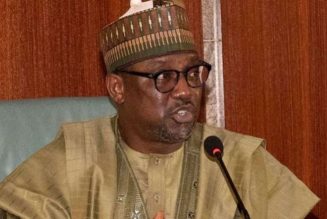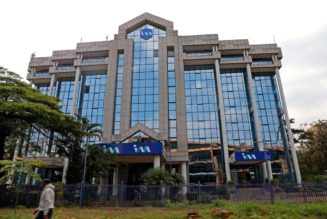Data Hub
Bid to make Kenya regional healthcare hub gains pace
Wednesday May 03 2023
A view of the Integrated Molecular Imaging Center (IMIC) located at the Kenyatta University Teaching Referral and Research Hospital (KUTRRH) as pictured on January 10, 2022. PHOTO | LUCY WANJIRU | NMG
The government’s plan to make Kenya a regional healthcare destination and a pharmaceutical manufacturing hub is gradually gaining traction.
The country is etching its name regionally as a preferred destination for medical tourism for East and Central Africa, attracting high-quality technology and facilities as well as support from global organisations in a bid to match the levels of countries such as India.
This is to curb the emergence of other pandemics such as Covid-19, which ravaged the world, putting health systems to severe tests.
Countries across the world, especially developing ones, have been caught off-guard as diseases such as Ebola and Marburg emerge, further calling for fixing of emergency health systems.
CyberKnife equipment at the Kenyatta University Teaching, Referral and Research Hospital is the latest high-technology facility aimed at revolutionising cancer treatment in Kenya and the wider East African region.
The technology is an advanced form of radiation therapy that uses high-energy X-rays to destroy cancer cells with pinpoint accuracy. It is a painless and minimally invasive procedure that offers low risks to patients.
“The deliberate scaling up of investment in comprehensive medical care and enhanced cancer control programmes will help save lives, advance the government’s Universal Healthcare Coverage agenda, and bring us closer to meeting the United Nations’ sustainable development target of reducing cancer-related deaths by a third in 15 years,” said the government.
The technology, which goes live in June comes at a time receiving cancer treatment has proven almost impossible, especially for those living below a dollar per day due to the high cost.
Read: IFC okays Sh1.7bn Avenue Hospital growth loan
CyberKnife will provide services to patients free of charge. So far, 36 patients are on the waiting list.
In Kenya, cancer is the third leading cause of death after infectious and cardiovascular diseases. It kills an estimated 30,000 people while 47,000 are diagnosed with the disease every year.
The country is also scaling up its efforts in the fight against kidney disease with the construction of the East Africa Kidney Institute (EAKI), which is set to open in September.
The EAKI is expected to be a centre of excellence and a game-changer in the management of kidney diseases in the region.
The institute will host a 45-bed dialysis department, a 20-bed critical care area, a next-generation image diagnostic area, laboratories, support outpatient services, and two floors with rooms to accommodate 160 patients.
“This institute is not just going to be about dialysis and renal replacement and transplantation, we have also got cancer, which is among the leading causes of death in this country — prostate, cervical and other cancers will also be handled at the institute,” said Peter Mungai, director at the East African Kidney Institute
The Ministry of Health estimates that more than 1.8 million Kenyans suffer from chronic kidney disease, contributed to by late diagnosis, limited access to treatment, and poor control of non-communicable diseases such as hypertension and diabetes, a situation expected to be resolved by the EAKI.
The new initiatives will see the number of patients seeking treatment abroad reduce as that of the patients from abroad increase.
Kenya already attracts patients from several countries including Uganda, Rwanda, Burundi, the Democratic Republic of Congo, Tanzania, Ethiopia, South Sudan and Nigeria.
According to the Health ministry, about 5,000 foreigners seek treatment in Kenya every year, an opportunity that could be exploited.
Similarly, the number of Kenyans who travel abroad for treatment, according to official data, stands at 10,000 annually.
On the pharma front, the manufacturing capacity is expected to grow due to confidence and interest from the international bodies receiving accreditation from the World Health Organisation (WHO) to manufacture for the global market.
Moderna has finalised an agreement with the government to establish in Kenya an mRNA manufacturing facility — the first in Africa, with the capacity to produce up to 500 million vaccine doses annually.
The new facility is expected to enable the manufacturing of vaccines for Kenya and Africa and will be able to quickly scale up its production and respond to public health emergencies on the continent and worldwide.
“The finalisation of our agreement with the government of the Republic of Kenya is a key pillar of our global public health strategy, where we hope to bring mRNA innovation to the people of Africa in areas of high unmet need, such as acute respiratory infections, as well as persistent infectious diseases like HIV/Aids and outbreak threats such as Zika and Ebola,” said Moderna CEO Stéphane Bancel.
Read: City Mortuary set to unveil private wing
According to Trade Cabinet Secretary Moses Kuria, this investment creates the momentum to meet the $10 billion annual target under the government’s Manufacturing ‘20 by 30 vision, in which Kenya plans to grow the contribution of manufacturing to gross domestic product to 20 percent by the year 2030 from the current seven percent
The Moderna facility s just one of Kenya’s preparedness mechanisms for the emergence of any pandemic after the effects of Covid-19, which has so far killed 5,688 people.
Tonix Pharmaceuticals Holding Corp, a clinical-stage biopharmaceutical company, and Kenya Medical Research Institute will, in the next few months conduct the first phase of clinical study in Kenya to develop TNX-8011 as a vaccine to protect against monkeypox.
In partnership with the WHO, Kenya will also set up a regional health emergency hub and training centre to serve the African continent.









